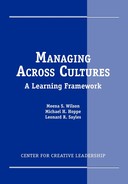Goals and Means of Achievement: Tough-Tender
How is success defined? Do the people in the culture strive for the tangible rewards of a high income and material satisfactions or the intangible rewards of good working relationships, time with family and friends, and satisfaction from spiritual development and volunteer work?
In societies near the Tough pole, people value—both in themselves and in others—ambition, competitiveness, and decisiveness. Big, for them, is beautiful. Work, or their “job,” plays a central role in their life. They wish to excel, greatly admire achievers, and covet the results of achievement.
Among the many “implicit cultural assumptions” of people in the U.S. cited by L. Robert Kohls (1981, p. 14) are the following: competition and free enterprise, an action orientation, materialism, and a problem-solving orientation.
In cultures near the Tender pole, people strive for cooperation and harmony within the group. Mutual obligation is emphasized, as is the sharing of material and nonmaterial resources. Small is beautiful. They prefer the slogan “Work to live” rather than “Live to work.” They feel sympathy for those who are less fortunate.
In cultures such as those of the Netherlands and Indonesia, if there is a conflict between work and social relationships, social relationships are likely to take priority. Though this may seem like a weakness of character, in these cultures a great deal of time is devoted to friendships. Frequent and unexpected visits between friends are the norm, favors and gifts are freely exchanged, and both criticism and caretaking behaviors are more common between those with affective ties. Such ties also involve a certain amount of dependency and obligation.
These values affect the following practices and behaviors.
Competition and cooperation. The U.S. culture encourages competition so that continually higher standards of achievement are set and met. Competitive challenge is seen as making each person perform at his or her highest level of capability. Because the job must be done and tangible achievements are valued, individuals who give top priority to the bottom line and get results are the ones considered most effective and are usually well rewarded for their efforts. Individuals come to believe that their success in life comes from besting others. The Darwinian concept of the survival of the fittest is often referenced.
The economic system of free enterprise is the institutional expression of this value. It is based on the strong belief that a highly competitive economy will create the most rapid technological and social progress.
The value placed on competitive individual achievement is so great in the U.S. that incentives rewarding team productivity are sometimes viewed with disfavor. When working abroad, some U.S. managers come to see, for the first time, how dominating and assertive U.S. managers can be, compared to their counterparts, and how much easier it is for some non-U.S. managers to work in teams.
However, they may also observe the downside of norms favoring overly cooperative attitudes. When competition is alien to their culture and values, employees are reluctant to assert themselves and may suppress their ideas. They also tend not to respond, at least at the outset, to competition-based incentives.
Modesty. The value placed on social harmony is an inducement to be modest as well. Managers in many parts of the world—for example, Finland, South Korea, Thailand, Costa Rica, and Guatemala—rarely refer to individual accomplishments or openly talk about personal successes. They believe that one person is seldom responsible for the great achievements that come about in an organization. Similarly, it is common for people from these cultures to deny their expertise or talents and to refer to the effectiveness of others in glowing terms. In such cultures U.S. managers often seem offensively boastful.
The ease with which U.S. organizations utilize, and individuals seek and accept, feedback and help toward self-development can be perceived as immodest and narcissistic by people from other cultures. Edward Hall (personal conversation, SIETAR Conference, 1994) recounts how amusing Native Americans found him to be when, starting his first job among them as a 26-year-old, he continually asked, “How am I doing?” His excessive preoccupation with gaining recognition for his efforts and performance seemed unbalanced to them.
Separating family considerations from work life. Historically, not letting family and personal life interfere with achieving career objectives has been important in large U.S. organizations. The U.S. is somewhat unusual in presuming that family and work priorities should be clearly separated. Until recently, for example, companies freely disregarded the family cost of frequent moves. Family considerations, such as the effect of disrupting the schooling of children or the need to take care of elderly and ailing parents, still tend to be ignored when expatriate assignments are made.
In the U.S. there is now increasing concern for family issues in the workplace; however, the repercussions of work intruding on family life are usually more serious abroad. A U.S. expatriate manager proudly reported an atypical decision that he had made: He refused his boss’s direct order (via a fax from the U.S.) to cancel all vacations for the upcoming two weeks because of an internal crisis in the company. The expatriate manager acted instead on his knowledge that his European subordinates would not take kindly to a sacrifice of family commitments (Sayles, research notes).
Thus, in many countries the role of the employee as a family member is more clearly recognized and respected. A manager found a notable contrast in the tone of the professional recommendations given him by former supervisors from the U.S. and the Netherlands. The U.S. supervisor focused solely on the manager’s professional achievements; the Dutch supervisor also commended him as “a loyal friend who takes care of his family” (Sayles, research notes).
